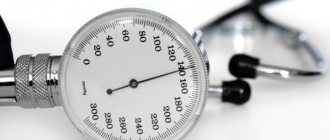December 10, 2019
Every pregnant woman needs to control many different factors that could potentially affect her condition: nutrition, lifestyle, stress, environment, bad habits, etc. It is important to closely monitor your health, because the baby’s health directly depends on it. One of the key points in this issue is the level of blood pressure, at high levels of which the risk of developing conditions that threaten the lives of both the expectant mother and the child increases.
What is normal blood pressure? This indicator cannot be universal for everyone. It is generally accepted that the range from 120/80 to 140/90 is a conditional norm. If the pressure level is below the minimum value, then the person is diagnosed with “hypotension”, if higher - “arterial hypertension” (AH). The goal of treating such deviations is to bring the pressure into the specified range with the help of drug therapy and non-drug measures (physical activity, proper nutrition, reducing stress levels, walking in the fresh air, normalizing weight, etc.). During pregnancy, the lower end of the range may drop to 90/60. This variation in indicators is characterized by the fact that the expectant mother’s body undergoes constant changes, which certainly affects her condition and well-being. Therefore, the pressure can “jump” from the lower to the upper limit. Even if nothing bothers a woman, it is important to control her blood pressure. Moreover, it is worth measuring it not only during scheduled visits to the doctor, but also independently every day. In cases where the expectant mother’s blood pressure exceeds the upper conventional norm, during pregnancy it has increased significantly compared to normal, or the diastolic (lower) pressure was recorded at least once above 110, then most likely the doctor will diagnose “hypertension.” And here you can’t do without treatment.
It is worth measuring your blood pressure not only during routine visits to the doctor, but also doing it yourself every day.
High blood pressure: is it so dangerous?
High blood pressure leads to changes in tissues and organs, primarily affecting the cardiovascular system. At the same time, the baby is also involved in this process - the mother’s pressure prevents the correct formation of organs, as a result of which the child may develop congenital defects of the heart, blood vessels, circulatory system, etc. So, what are the pathological conditions associated with high blood pressure in the mother? can affect the baby's health? As a result of hypertension, disturbances in the blood supply to the placenta occur - preeclampsia
.
The main symptoms to look out for are: persistent headaches, stomach pain, vision changes such as blurred vision, spots or lights, swelling of the face or hands, nausea or vomiting, sudden weight gain and breathing problems. Often, preeclampsia has no obvious symptoms. This is another reason why it is extremely important to receive regular prenatal care, monitor your blood pressure, and have urine and blood tests. They will help identify liver or kidney dysfunction. The most dangerous complication of preeclampsia is eclampsia
, a condition in which a woman’s blood circulation to the brain is impaired. This leads to a sudden seizure with severe convulsions and coma, which can result in the death of the mother or miscarriage.
The mother's pressure prevents the correct formation of organs, as a result of which the child may develop congenital defects of the heart, blood vessels, and circulatory system.
Arterial hypertension is not always an independent disease. Sometimes high blood pressure becomes a marker of another dangerous condition. One of these pathological conditions is gestosis
, which can provoke dysfunction of a woman’s vital organs.
The main symptoms of gestosis are high blood pressure, persistent swelling and increased protein content in the urine. With this complication during pregnancy, kidney function is disrupted, and eclampsia also develops, as mentioned above. By the way, currently there are not only personal tonometers, but also personal urine analyzers that reliably determine the protein content in the urine and can be connected to a smartphone. Another danger associated with high blood pressure is fetoplacental insufficiency
, in which the oxygen supply to the fetus is disrupted.
This is fraught with stopping its development and can lead to the death of the fetus. Premature placental abruption
is a complication also caused by high blood pressure. And if in the later stages, closer to childbirth, such a pathological condition can still be resolved favorably, then at the beginning or middle of pregnancy, premature birth ends in the death of the baby.
Hypertension during pregnancy: norms and deviations
Every woman should know her usual blood pressure (BP). For some it may be lower than 120/80, for others it may be slightly higher.
When visiting your leading gynecologist, your blood pressure is measured every time. Of course, such manipulations are not carried out without reason - excessively high blood pressure can signal an unfavorable condition for the patient and the fetus.
Normal blood pressure during pregnancy varies between 100/60-140/90. An increase in this indicator by 15% shows the following picture:
- blood vessels constrict
- there is excessive strain on the heart muscle
- the fetus stops growing due to lack of oxygen
- placental insufficiency may develop
- Cases of placental abruption in the early stages have been recorded.
What should you pay attention to?
Symptoms that may alert you include tinnitus, spots before the eyes, headache, dizziness, nausea and vomiting, increased swelling, as well as red spots on the skin after minor physical activity or minor stress. These signs are sure companions of high pressure and should not be ignored. However, high blood pressure does not always manifest itself. You can completely calmly go about your daily activities and not even suspect that “bad” changes are happening in your body. That is why you need to independently monitor your blood pressure level.
You can completely calmly go about your daily activities and not even suspect that “bad” changes are happening in your body.
A woman's condition during pregnancy is constantly changing. Toxicosis, fatigue or hyperactivity, despondency or, conversely, emotional excitement - all this, within reasonable limits, is the norm. But if any symptoms seem inappropriate to you, it is better to consult a doctor for advice.
Is it possible to influence your own blood pressure?
How do hypotensive patients usually increase their blood pressure? The first thing that comes to mind is special medications. But their action is harmful to the unborn child. The effect of such drugs is to narrow the blood vessels. But this necessarily affects the blood supply to the fetus. Together with the blood, the baby does not receive enough nutrients necessary for growth. As a result, there is a risk of developmental defects.
This means we need to look for other ways to cope with the pressure. There are many of them, and they should be used in combination.
- For dizziness and weakness caused by low blood pressure, it is good to lie down for a while with your legs elevated. Blood will flow from the lower extremities to the upper body. The brain will be saturated with oxygen, and your health will improve. By the way, this pose is also useful for preventing varicose veins.
- Another quick way to raise blood pressure is a contrast shower. You need to finish the procedure with cold water.
- Three minute rule. When you wake up, you don’t need to immediately jump out of bed. This can cause a sharp drop in pressure. It’s better to lie down for at least another 3-5 minutes and then get up. You can even eat something right there, in bed. It is convenient to keep a small food supply on the bedside table: crackers, bread or dry biscuits.
- To keep your blood vessels in good shape, you should not neglect physical exercise for pregnant women, swimming and other acceptable physical activities.
- Sometimes you can afford to drink a cup of coffee, but not too strong. Sweet tea can also help. A few slices of chocolate are a good “cure” in this case.
- Another secret is proper nutrition. You need to eat in accordance with the dietary recommendations for expectant mothers. Eat food often, but in small portions.
- Don't forget about the drinking regime. Sometimes it happens that the doctor insists on limiting fluid intake, for example, due to kidney problems. But if there is no such restriction, you need to drink more water and juices. It is better to discuss the exact amount of drinking with your pregnancy doctor.
- And finally, perhaps the simplest and most accessible way to raise blood pressure is to walk more. Fresh air significantly improves your well-being. Not only does blood pressure go up, but also mood, which is also important for the expectant mother.
Where does high blood pressure come from?
High blood pressure can accompany a woman during pregnancy if she was previously diagnosed with hypertension. In this case, it is doubly important to monitor your condition and listen to all the doctor’s recommendations. You should not take the same medications that were prescribed before pregnancy, as they may affect the development of the fetus. There are medications that do not have side effects on the baby; your doctor will select them for you.
There are medications for blood pressure that do not have side effects on the baby; your doctor will select them for you.
You can also “acquire” high blood pressure as a result of constant stress, heredity, smoking, overweight or obesity, diabetes mellitus or other concomitant diseases of the kidneys, thyroid gland, adrenal glands, or pituitary gland. In any case, consultation with a specialist is necessary to minimize the risk of developing hypertension while expecting a child. To do this, it is advisable at the stage of pregnancy planning to eliminate all provoking factors, cure concomitant diseases, and get rid of bad habits.
Foods that increase blood pressure
A proper diet will help regulate tone, strengthen the walls of blood vessels, and normalize blood flow. It is advisable to eat 4-5 times a day, in small portions. Take dietary recipes as a basis: meat (fish) + vegetables + fruits. Carbohydrates lead in the rate of absorption, but you should not consume them in large quantities. A small piece of chocolate or honey will help you quickly restore your well-being. Foods to increase blood pressure should be:
- healthy, containing iron;
- healthy, containing flavonoids;
- rich in proteins.
How to lower blood pressure?
Self-medication during pregnancy is contraindicated.
Drugs that have helped someone close to you may have a negative impact on your health and the health of your baby. Therefore, all medications should be prescribed by a doctor after a comprehensive examination. It is worth abandoning the independent choice of herbal medicines and dietary supplements. Pregnancy is a contraindication for taking most of them. They can enhance or slow down the effect of the medications you take, cause allergies and a number of other complications. In order for your blood pressure to remain normal, it is important to control your weight, exercise (of course, within reasonable limits and after consulting a doctor), eliminate foods that increase blood pressure (coffee, strong black tea, chocolate) from your diet, and give up bad habits. High blood pressure is a condition that can and should be dealt with, especially during pregnancy. To prevent the development of complications associated with hypertension, it is enough to control your blood pressure and follow simple doctor’s recommendations. And then you and your baby will be healthy. Tags:
- Pressure
- pregnancy
- complications
To leave a comment you must be an authorized user
Reviews
Karina, 32 years old
I never thought that without pills you can normally increase your blood pressure during pregnancy! You just need to follow the rules of a healthy diet and add healthy fruits and vegetables to your diet. For example, cranberry helped me a lot. I don’t like to eat it, it’s very sour, but the drink turns out very tasty. Even after giving birth, I eat only healthy food.
Alesya, 41 years old
I got pregnant late, at 40 years old. With my low blood pressure, I was initially prepared for possible complications. However, after reading information on the Internet and consulting with a neurologist, who told me how to increase blood pressure during pregnancy, I decided to focus on physical therapy. In addition, I carefully monitored my diet, avoiding unhealthy hamburgers, chips and crackers. The result is an independent birth and a healthy girl weighing 3.4 kg.
Marianna, 17 years old
I have had low blood pressure for life, and when I came to register as pregnant at 16 years old, the doctor was horrified. I was very worried that this could affect the child, I didn’t know what to do, so when the local police officer advised me how to normalize blood pressure during pregnancy (drink herbal infusions and beet juice), I followed the instructions without hesitation. I want to say that it’s been two weeks since I safely gave birth to a healthy baby, everything helped! You don’t have to overpay for expensive medications; proper nutrition is the most effective way.
Why does blood pressure change in pregnant women?
The body has to adapt to a special condition - pregnancy. A woman’s body weight gradually increases, and additional blood circulation is activated between the uterus and placenta. The functioning of the heart and blood vessels at this time is affected by:
- Changes in hormonal levels;
- An increasing volume of blood circulating in the body;
- Increased tone of the central nervous system;
- Changing the location of the diaphragm, which rises upward;
- Increased pressure inside the abdominal cavity;
- Displacement of the heart in the chest;
- Increased heart rate.
The body directs all its efforts to improve blood flow in the placenta and in the uterus, because this is necessary to provide the developing fetus with oxygen and nutrients. Under these circumstances, blood pressure changes.
Normal blood pressure in pregnant women
Blood pressure levels in pregnant women also depend on the trimester. In general, the optimal indicator is 120-130/80-85. The upper permissible limit is 130-139 mmHg. for systolic and 85-89 mm Hg. for diastolic pressure. Blood pressure exceeding 140/90 is considered elevated.
By trimester, the table of normal values looks like this:
| Pressure norm | Index |
| First trimester | 110-120/70-80 |
| Second trimester | Not higher than 130/85 |
| Third trimester | From 140/90 to 100/60 |
It is important to consider that each body is individual, and each woman has her own normal blood pressure. That is why blood pressure readings should be compared not only with norms, but also with the usual pressure at which a woman feels good.











